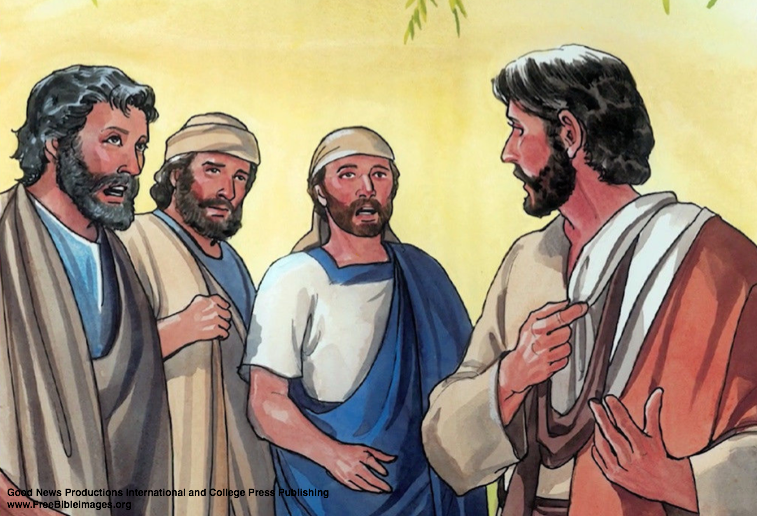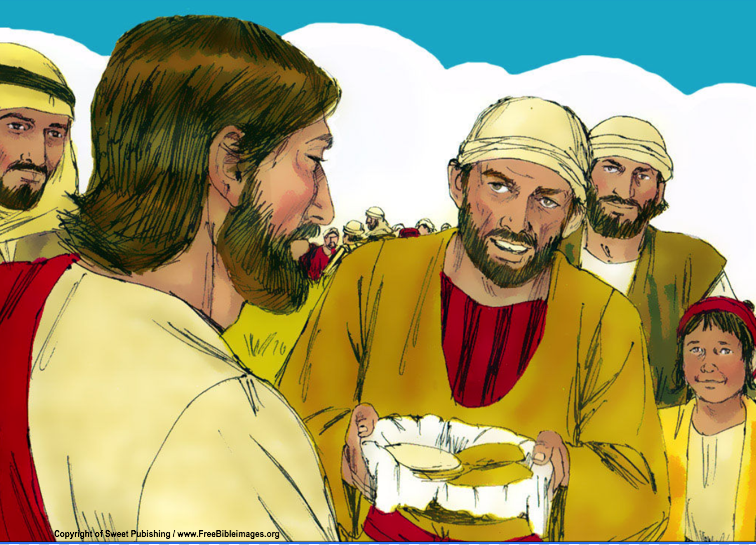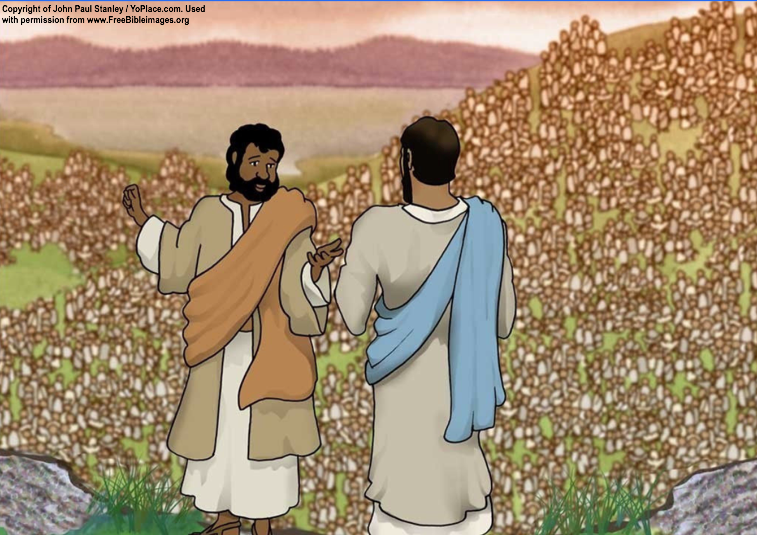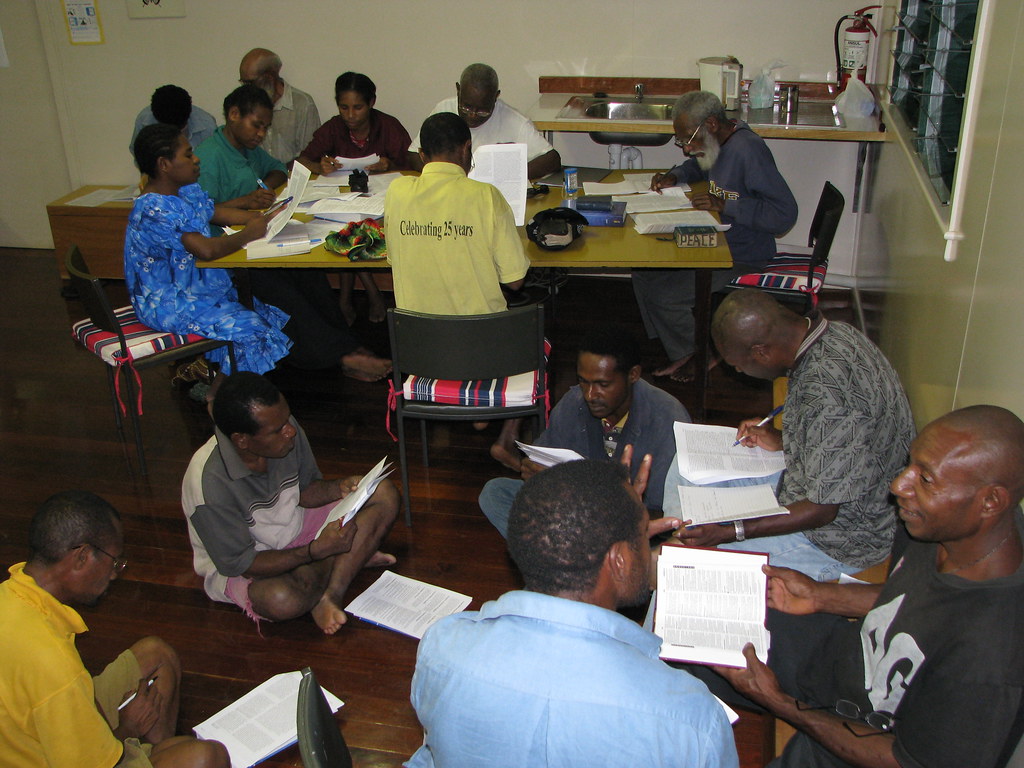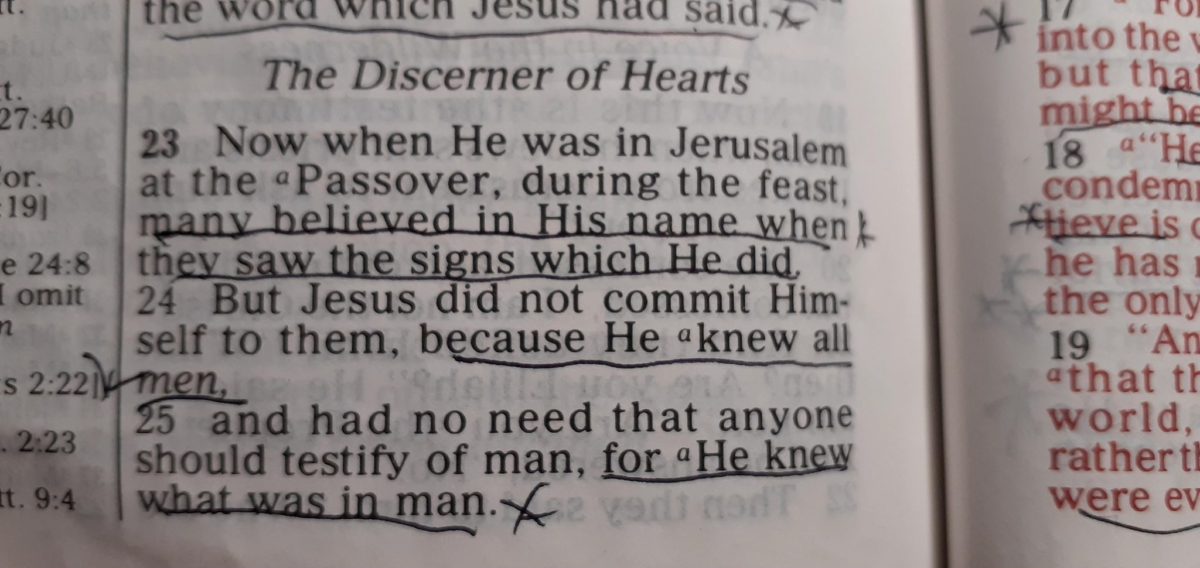“‘But there are some of you who do not believe.’ For Jesus knew from the beginning who they were who did not believe, and who would betray Him.” John 6:64
The third reason why some disciples or followers of Jesus abandon Him is because THEY DISBELIEVE JESUS (John 6:64-66) and have no capacity to understand and follow Him. “‘But there are some of you who do not believe.’ For Jesus knew from the beginning who they were who did not believe, and who would betray Him.” (John 6:64). Some of the people who had been following Jesus and listening to His instruction had not believed in Him for His gift of everlasting life. They were disciples, that is, they placed themselves under Jesus’s instruction, but they were unsaved.
“Many of His disciples” found His words difficult (John 6:60, 66) and “some” of them did not believe in Christ for salvation (John 6:64a). Both saved and unsaved disciples found Jesus’s words to be disturbing. If Jesus knew that some were unsaved, why did He let them start out on the pathway of discipleship? Because He loved them, even Judas. Luke 19:10 says, “For the Son of Man has come to seek and to save that which was lost.” If they wanted to sit under Jesus’s teaching day after day, why not? That way He could seek them day after day. God’s love is unlimited and is directed toward every person. It gets me excited to think we may have people who don’t know Christ coming to our Facebook page and website. God’s grace is available to everyone.
Then Jesus said, “Therefore I have said to you that no one can come to Me unless it has been granted to him by My Father.” (John 6:65). Is Jesus teaching that only a small percent of people, the elect, are able to believe and be born again? Not at all, and here is why.
God never commands something to be done that the listener is unable to do. And God commands all people to believe in His Son for everlasting life (I John 3:23; cf. John 3:16; Acts 16:31). Since God is drawing all people (John 12:32; 16:8-11), including those who never believe, He has certainly given everyone the capacity to believe.
The unbelieving disciples He is talking to in this large group are being drawn to believe in Jesus. They should seek to understand Christ’s words because they give life (John 6:63). If they turn away from Christ’s teaching now because it is difficult for them to believe, then God may stop drawing them. Nowhere are we told how long God draws an unbeliever to Himself. God may draw someone for eighty years or eight days. But this drawing is resistible.
For example, Judas resisted God’s intense drawing for over three years. All who die without Christ have rejected God’s drawing in their life. It is possible that God may stop drawing an unbeliever who hardens his heart. But Jesus’ point in verse 65 is that it is impossible for lost people to come to Christ without the help of God. God must work in their hearts. God may be drawing some of you. Maybe you have started reading the Bible or going to church. Perhaps you are visiting Christian websites online. This is an indication that God is working in your heart to draw you to His Son.
“From that time many of His disciples went back and walked with Him no more.” (John 6:66). This is perhaps the most “unsuccessful” sermon Jesus ever preached. When John chapter 6 opens, Jesus had 12,000-20,000 people following Him and listening to Him speak (John 6:10; cf. Matthew 14:21). When this chapter closes, He only has twelve men with Him and one of them is not even saved (John 6:67). Unlike some preachers today, Jesus did not sugar coat His message. He was not trying to win a popularity contest by preaching what people wanted to hear. This is a significant turning point in Christ’s ministry. He is shifting from a public ministry of up to twenty thousand to a more private training of the Twelve. As a result of this sermon, many of Jesus’s followers withdrew and went back to the things they had left behind (i.e. families, work, old habits and ways of thinking).
When you compare verse 66 with verse 64, you can see that “some” of those who abandoned Christ were Christians. Some did “not believe,” but “many” withdrew from Jesus. It was more demanding than even some of the believers expected.
Throughout my time as a pastor and evangelist, I have witnessed “disciples” withdrawing from Jesus and walking with Him no more. Much like the people in this crowd with Jesus, they stopped placing themselves under the teaching of God’s Word. Why? The teaching may have been too difficult or too disturbing to them. They may have been offended by the message of salvation which says eternal life is a free gift that one receives by believing in Christ alone apart from any works or merit of our own (John 4:10-14; Romans 6:23; Ephesians 2:8-9). So they abandon Christ to follow a preacher who says what they want to hear (2 Timothy 4:3-4).
Others may drop off because they have not yet believed in Jesus so they don’t have God the Holy Spirit living inside them to give them the capacity to understand and follow Christ’s teaching (cf. John 7:38-39; I Corinthians 2:10-16). Some believers may drop off because God is calling them to a deeper level of commitment and they still want to be in charge of their own lives so they pull away. Only the Lord knows for sure.
Where are you in relation to Jesus Christ? Are you following Him from a distance? Are you intrigued by His claims to be God? Have you noticed how loving and gracious He is with those who seek Him? Do you feel Jesus pulling you closer to Him as you listen to what He has to say? As you listen to Christ, do you find yourself having a difficult time understanding what He means? Do His words offend you? Is He demanding more of you and you do not want to place yourself under His control?
Wherever you find yourself in relation to Jesus Christ, please know that He loves you and He wants to spend time with you. Will you give Jesus a chance? Will you open your heart to what He has to say to you? Jesus loved Judas to the end of his life (John 13:1) even though Judas never believed in Christ for His gift of eternal life (John 6:64, 70-71; cf. 12:4; 13:2, 10-11, 21-30; 17:12; 18:2, 5). Please do not be like Judas and never believe or trust in Christ alone to save you from your sins and give you everlasting life.
We are also reminded by Judas Iscariot’s relationship with Jesus that what determines a person’s eternal destiny is not their works. Judas did many works for Jesus Christ as His disciple (Matthew 10:1ff; Mark 6:7-13; Luke 9:1-6), but his unbelief toward Jesus condemned him to an eternity in the Lake of Fire (John 3:18; 6:64, 70-71; 13:10-11; 16:7-11; 17:12). The Bible tells us that it is not our works that determine whether we go to heaven or hell (Romans 4:5; Ephesians 2:8-9), but our response to Jesus Christ. “He who believes in the Son has everlasting life; and he who does not believe the Son shall not see life, but the wrath of God abides on him.” (John 3:36).
On Judgment Day there will be many false prophets (Matthew 7:15) who stand before Jesus and appeal to their words (“Lord, Lord”) and to their good works (“prophesied…cast out demons…done many wonders”) that they have done “in His name” for His glory as the basis of their entrance into the kingdom of heaven (Matthew 7:21-22). And Jesus will say to them, “I never knew you; depart from Me, you who practice lawlessness.” (Matthew 7:23). Why does He say this? Because they had failed to do “the will of the Father in heaven” as it relates to entering the kingdom of heaven (Matthew 7:21b). Jesus said, “And this is the will of Him who sent Me, that everyone who sees the Son and believes in Him may have everlasting life; and I will raise him up at the last day” (John 6:40; cf. 3:5, 15-16). Until a person is rightly related to Jesus by believing in Him for everlasting life, all their good works, words, and thoughts are “lawlessness” before a holy God (Matthew 7:23; cf. Isaiah 64:6).
Do you “believe in the Son,” Jesus Christ, for “everlasting life”? If so, then God promises that you now have “everlasting life” and your name is written in the Book of Life so that you will enjoy a home in heaven (John 3:36a; Revelation 21:27). But if you reject Jesus Christ or “do not believe the Son,” you “shall not see life” in heaven, “but the wrath of God abides” on you both now and forever in the Lake of Fire (John 3:36b; Revelation 20:15). It does not matter how many good works you have done for Jesus, if you do not believe in Him alone for His gift of everlasting life, you will still suffer torment forever in the Lake of Fire (Romans 4:5; Ephesians 2:8-9; Revelation 20:10, 15).
Prayer: Almighty God and Savior, You know my heart better than anyone. You know every thought, feeling, and motive I have ever had. I can hide nothing from You. Although You know everything about me – the good, the bad, and the ugly – You love me and long to be in a personal relationship with me. Thank You for drawing me to Yourself through Your Word and the testimony of other Christians. Lord, please remove anything in my life that would hinder me from following You more closely. I do not want to be like those who abandoned You and walked with You no more because they found Your teaching to be difficult or disturbing. Knowing how much You love me and value me, motivates me to stay close to You. Precious Lord Jesus, please continue to draw those who do not believe in You yet to Yourself. Please send others to model Your grace and truth to them. Thank You my Lord and my God for hearing my prayer. In Jesus’s name. Amen.

